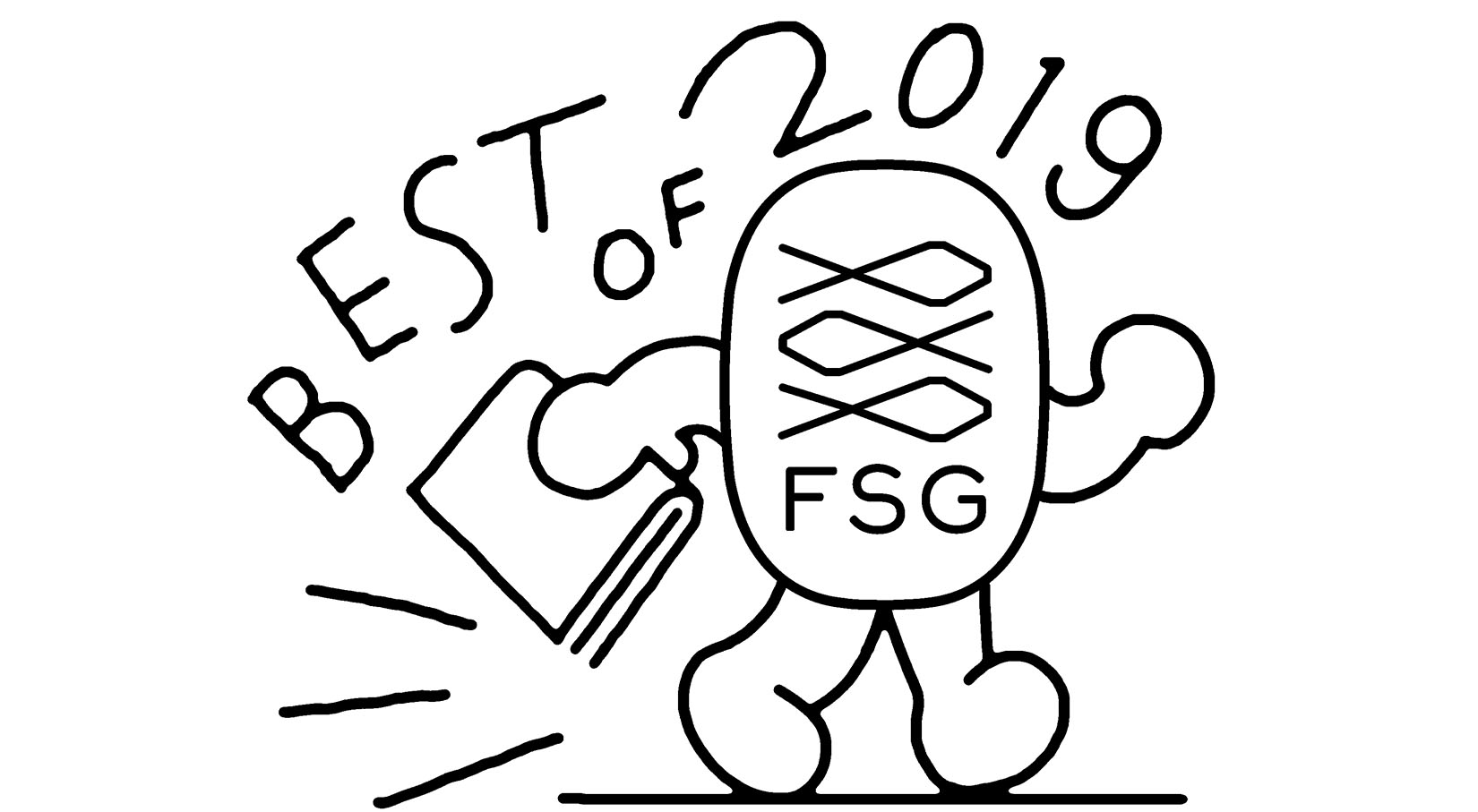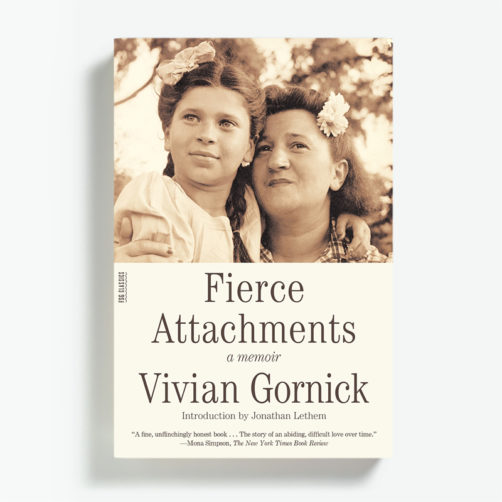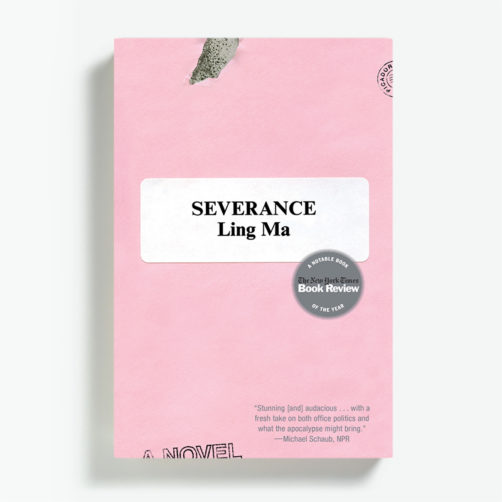We asked the staff of Farrar, Straus and Giroux to pick the best book published this year, name their favorite titles—old, new, or forthcoming—that they read or reread this year, and share which FSG books they’ll be gifting during the holidays.
THE BEST BOOKS PUBLISHED IN 2019
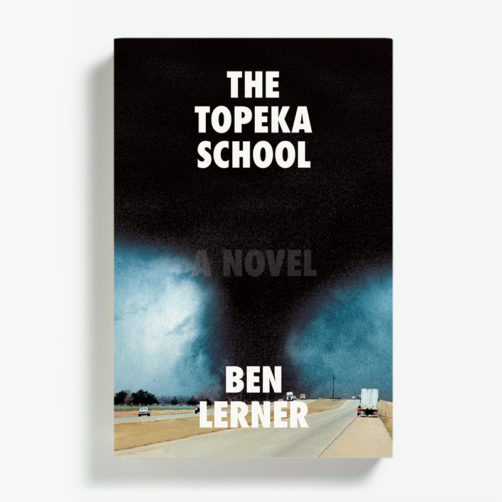
The Topeka School by Ben Lerner
More than forty books were nominated by the FSG staff as their picks for the “best book of the year” but the top spot, with thirteen votes, was taken by FSG’s very own Ben Lerner with The Topeka School!
In a triple tie for second place with five votes each were Ghost Wall by Sarah Moss, On Earth We’re Briefly Gorgeous by Ocean Vuong, and Normal People by Sally Rooney.
In third place there was another tie with three votes each, The Undying by Anne Boyer and Trick Mirror by Jia Tolentino.
Other titles that received multiple votes were Stay and Fight by Madeline ffitch, The Unpassing by Chia-Chia Lin, Lost Children Archive by Valeria Luiselli, The Nickel Boys by Colson Whitehead, The Man Who Saw Everything by Deborah Levy, and Say Nothing by Patrick Radden Keefe.
OUR FAVORITE READS THIS YEAR
Jen Beagin’s Pretend I’m Dead was one of my favorite books of last year, so I loved spending more time in the world of Mona the cleaning lady—one of the most irreverent and vivid narrators I’ve ever read, like a combination of Lucia Berlin meets Miranda July, but at the same time, a voice fully her own—in Vacuum in the Dark (with a cover designed by our own Alex Merto!).
Erin Somers’s Stay Up with Hugo Best is about an aspiring comedian and the world of TV, but it might be the best book I’ve read in capturing the surreal feeling of growing up to work in an industry you’ve spent your whole life loving from afar.
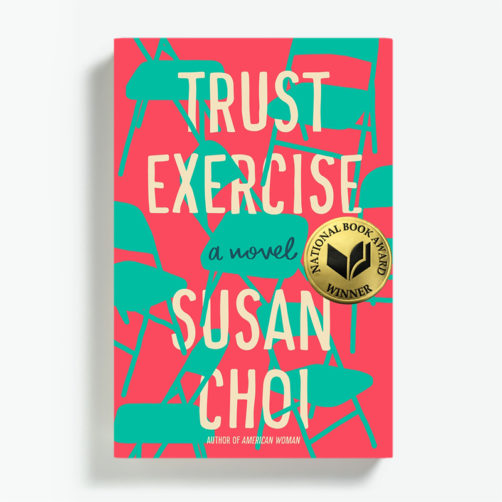
Trust Exercise by Susan Choi
There’s so much to say about Susan Choi’s Trust Exercise—how it has the ability to rock your world, and your perceptions of fiction, truth, and reality, or rather, the fluctuating divide between those three realms—but the part I might be most in awe of is how insidiously and terrifyingly real its villain (if you can call him that, for this is a novel where nothing is that simple) is drawn.
Sarah Moss’s Ghost Wall is an urgent and all-consuming read that sneaks up on you in its sheer horror and utter brilliance.
I wrote about it last year as an anticipated book for 2019, but it’s so good I’m still thinking about it and need to mention it again: Maryse Meijer’s Rag is unlike anything else you’ll read this year, and “Her Blood” is a perfect short story.
Some older books I read and loved this year include Molly Fox’s Birthday by Deirdre Madden, a novel that feels much like Rachel Cusk’s Outline trilogy, and luminous in its lyricism and intimacy; and Nami Mun’s Miles from Nowhere, an ARC of which somehow made its way into my possession long before I worked in publishing and was rediscovered in my childhood bedroom on a snowy weekend home this past winter. I wanted to underline every perfect sentence in this perfect novel, and I want to read it again and again but I need to recover from how fully it shattered me in its aching beauty the first time around.
NIKKI BARNHART
• • •
Upon getting this job in 2017, I was gifted a copy of Elena Ferrante’s My Brilliant Friend from the poet Michele Somerville, who is also the mother of a close friend. I’m embarrassed to admit that it took over a year of starts and stops for me to get into it, but once I did, I was in. I read all four Neapolitan Novels this year. I have never felt my social and entropic anxieties so closely approximated.
Sally Rooney’s Conversations with Friends helped me articulate ~one hundred things about relationships I’ve been unable to say. I’m a sucker for dialogue, but I’m even more of a sucker for email (see last year’s Favorite Books for a similar gushing over Elif Batuman’s The Idiot).
I most recently read Joni Murphy’s debut, Double Teenage, after meeting with her about her forthcoming FSG novel, Talking Animals. In it, violence swirls around a friendship between two teenagers, Celine and Julie, as they grow apart and never quite together again. Both girls flee their hometown in the Southwest and learn the crucial lesson of adolescence: “The girls thought the feeling of suffocation was particular to their town. They learn later it was not.”
Power to the female friendship.
ALEXIS NOWICKI
• • •
I didn’t get to read as much as I wanted to this year, but a couple of books brought me a lot of joy. Sarah Schulman’s The Gentrification of the Mind absolutely captivated me. Part memoir, part history, part social theory, and part criticism, it’s a heartbreaking and perspective-altering look at the AIDS crisis, New York City, privilege, art, and what happens when we lose touch with our history. It changed how I see the city I live in as well as my understanding of what it means to be queer. I’ve been lucky enough to be Sarah’s editor on her 2021 book Let the Record Show (an unparalleled, masterful history of ACT UP), and The Gentrification of the Mind only confirmed to me what a genius she is.
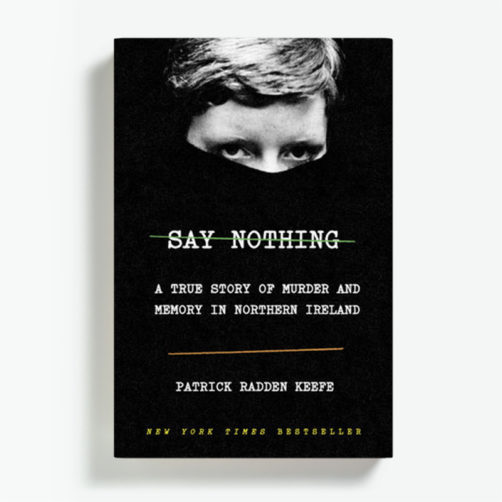
Say Nothing by Patrick Radden Keefe
Hernan Diaz’s In the Distance (I’m late, I know) was the best piece of fiction I read all year. I savored each page, and still think about it often. It’s a remarkable work of historical fiction—harsh and vivid and immersive and exact, and it features one of my favorite protagonists in recent memory. I also loved Joshua Whitehead’s Jonny Appleseed, a gorgeous, sexy, upsetting, hilarious, and just spellbinding debut novel. It follows a young, two-spirit Indigenous queer person named Jonny, who has a few days to save up enough money (via cam shows) to attend his beloved grandmother’s funeral back on the reservation. It’s a razor-sharp look at Canadian colonialism and police brutality toward the Canadian Indigenous (and Indigenous queer) community, but it’s also a book about home, and family, and finding a place for yourself in a world that has utterly rejected you. It made me cry and laugh and I highly recommend it. Finally, I read and loved Casey McQuiston’s Red, White & Royal Blue; Jenny Erpenbeck’s The End of Days; Gary Indiana’s Horse Crazy; Patrick Radden Keefe’s Say Nothing; Dennis Cooper’s Closer; and Garth Greenwell’s forthcoming Cleanness.
JACKSON HOWARD
• • •
South Wind by Norman Douglas: This once wildly beloved novel is on a par with Firbank in places, if less purple, and I call that high praise. I might also mention that the rather louche, not to say criminal, Mr. Douglas—whose final words on this earth were reportedly “Get those fucking nuns away from me!”—was responsible for what I consider a solid contender for funniest book in the English language, Some Limericks.
Middlemarch by George Eliot: Hey, yeah, it’s pretty good, right?
The Children’s Bach by Helen Garner: Finally caught up with this thanks to Text’s inexpensive hardcover reprint. Subtle, disorienting, savage. Apply to this address for additional adjectives.
The Counterfeiters by André Gide, translated by Dorothy Bussy: The unserious Gide is the Gide for me, though The Counterfeiters certainly has its moments of (putative) moral weight. What I take away from it is the palpable joy the “cubist” structure gave the author—the permission he awarded himself to come at his story whichever ways suited him. Interesting too to think that the young Pierre Klossowski would have been the model for one or more of the author stand-in character’s “secretaries.”
New Grub Street by George Gissing: Tremendous fun and far more clever and innovative than it is commonly given credit for being (or so it seemed to a novice Gissingian (?) like myself). Also, much to learn here about the material circumstances of writing/publishing in the very late Victorian era. I am working my way through other Gissing e’en now.
Do Everything in the Dark and Gone Tomorrow by Gary Indiana: For me, the summer of 2019 will always be the summer of Gissing and Gary. I’ve inhaled all of the Indiana fiction and much of the nonfiction in the months since. The titles listed here are my favorites today, but I reserve the right to change my mind. Resentment ain’t no slouch neither. Gary Indiana is a major writer, among the best American authors now living, and I’m a sap for not cottoning on sooner.
World Light by Halldór Laxness, translated by Magnus Magnusson: The poetic bildungsroman as very dark comedy. No one ever told me Laxness was such a magnificent, if basically compassionate, bastard. I shall return to him with relish.
An Accidental Man by Iris Murdoch: I’ve made several attempts to read Murdoch over the years. Failures. Thanks to MA Orthofer’s recommendation for this title in particular (a coveted A+ rating!), I finally managed it, and am convinced … of something. A Fairly Honourable Defeat next, thanks to Garth Greenwell’s rec.
The Collected Novels of Charles Wright: This is cheating, as I did not first read (“the other”) Charles Wright in 2019, but his novels were finally reprinted in 2019, so I’m saying it counts. This book (these books?) always count(s). The new edition even has a new intro by Ishmael Reed! This is my plug. Buy, read.
JEREMY DAVIES
• • •
This year I stumbled upon A Severed Head by Iris Murdoch in a used bookshop, and it completely swept me off my feet. It’s daring, flawed, and fun—and so, so British. Pure pleasure. It was definitely a highlight of my year.
I also loved The Best We Could Do by Thi Bui, which is a gorgeous graphic memoir that tells the story of a family before and after they emigrate from Vietnam to the United States. It’s a powerful book exploring colonialism, war, immigration, and intergenerational trauma, with nuance, complexity, and a very light touch. The striking, elegant illustrations have stuck in my head.
LYDIA ZOELLS
• • •
Toward the beginning of the year, I read Mesa of Sorrows by James F. Brooks. It’s a difficult book to summarize succinctly, but it’s the kind of history I enjoy: ostensibly about a single event that took place in 1700 in what is now northeast Arizona, it continually shifts focus to explore the various contexts of the event, and what it has meant to subsequent generations (while also pulling back the curtain a little bit on how historians and archaeologists do their work). Over the summer I read Yasunari Kawabata’s The Sound of the Mountain, a quiet, striking novel about a family living outside Tokyo in the years after the second World War. I was also hugely impacted this year by Samantha Power’s first book, A Problem from Hell. (And on the graphic novel front, I enjoyed a couple somewhat recent books: Audubon, On the Wings of the World by Fabien Grolleau, and Sarah Glidden’s Rolling Blackouts.)
STEPHEN WEIL
• • •
Catching the Big Fish by David Lynch is a great little book about unleashing your creativity and the power of meditation. The Topeka School was one of my favorites of the year, but more than that, the sections written in Jane’s voice, Adam Gordon’s mother, were some of the best writing I’ve read in years. Sarah Moss’s Ghost Wall was dark, funny, and disturbing. A thought provoking and unique book.
DANIEL DEL VALLE
• • •
Pnin by Vladimir Nabokov
Say Nothing by Patrick Radden Keefe
Paul Takes the Form of a Mortal Girl by Andrea Lawlor
In the Distance by Hernan Diaz
McGlue by Ottessa Moshfegh
JULIA RINGO
• • •
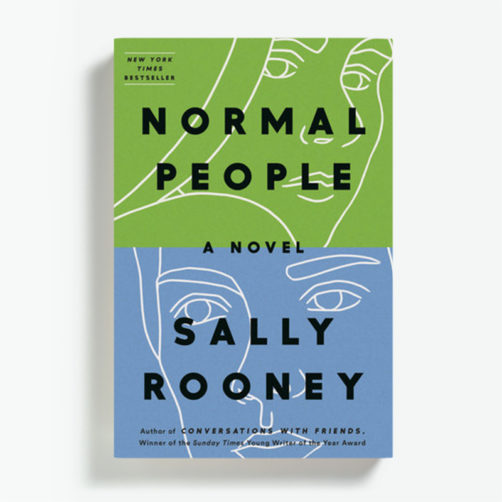
Normal People by Sally Rooney
T Kira Madden’s memoir, Long Live the Tribe of Fatherless Girls, was my favorite book this year. While reading, I kept closing it to put a hand on my chest and whisper “oh my god” to myself. That sounds very dramatic, but the writing is gorgeous and Madden is unflinching. My book club read an FSG classic, Anne Fadiman’s The Spirit Catches You and You Fall Down, which all of us loved and marveled at (the seamless blend of storytelling and history! the research!). Esmé Weijun Wang’s The Collected Schizophrenias blew my mind, as did Sally Rooney’s Normal People.
CARRIE HSIEH
• • •
Dead Girls by Alice Bolin
The Seas by Samantha Hunt
White is for Witching by Helen Oyeyemi
MADELINE DAY
• • •
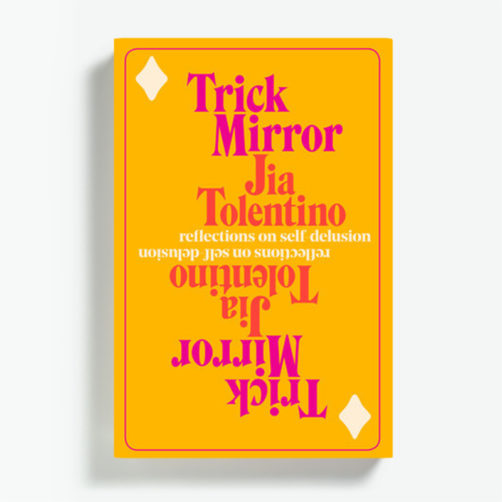
Trick Mirror by Jia Tolentino
I loved and admired The Topeka School by Ben Lerner (see gift recs!).
Trick Mirror by Jia Tolentino: yes, perhaps overcovered by the press, but definitely not overhyped. These brilliant essays reactivated my exhausted rage button with their incisive and kaleidoscopic examinations of our broken contemporary culture.
The Cost of Living by Deborah Levy: a smart, hilarious, wry piece of autofiction. Levy’s description of the terror and the exuberance of starting a new chapter of life following a midlife divorce was inspiring, and beautiful too.
FLORA ESTERLY
• • •
Far and away the best book I read this year was Patrica Lockwood’s Priestdaddy, the funniest, dirtiest, strangest, sexiest, most heartfelt and memorable book I’ve read in a long, long time. I actually rationed my reading of it over the course of weeks (something I’ve never done before) because I couldn’t bear for it to be over. My other favorite books this year included Sally Rooney’s Normal People, which so perfectly captures both the steady and ever-shifting power dynamics in young relationships, and Show Them A Good Time by Nicole Flattery, which I committed the unforgivable sin of ordering the British edition of online because it isn’t out in the US for a few months. It was worth it.
LIAT KAPLAN
• • •
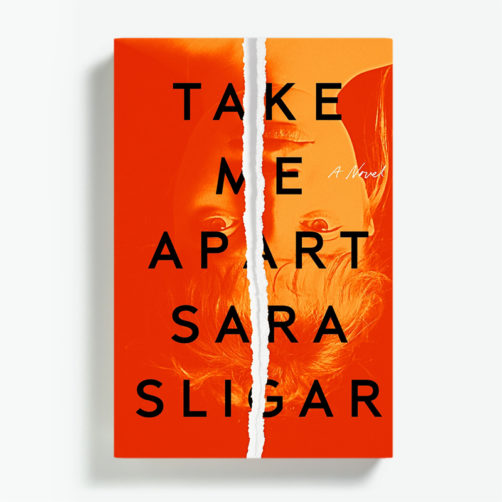
Take Me Apart by Sara Sligar
The Topeka School by Ben Lerner: I was so excited to learn that I would be working on this book and was immediately blown away by its candor, its grace, and its uncanny insight into our fraught here and now. Lerner’s prose will you sweep you along in its wake, leaving you wondering how on earth he got to be this good. It’s been eight months since I first read this book and I am still in awe. As my colleague, Milo Walls, once said: “If you don’t have anything nice to say about Ben Lerner, don’t talk to me.”
Take Me Apart by Sara Sligar: This past summer, I was in desperate need of a novel I could escape into. I printed out the manuscript of Take Me Apart (due out from MCD on April 28, 2020), went home, and did not leave my couch for the next eight hours. I did not eat, I refused to listen to my bladder, and instead tore through these pages with a ferocity I have rarely seen myself exhibit outside of devouring a hangover meal on a Saturday at 1pm. Seriously, my roommates were concerned. It is an eerie, atmospheric, and subtly sexy debut by a writer who is sure to make waves.
The Crying Book by Heather Christie: I have recently been in the midst of a massive reading slump. It’s a disconcerting phase to be in when you spend your days surrounded by great literature and are constantly being influenced by the best reviewed books of the week and your colleagues are always telling you about the best novels they’ve read this month. Usually, when I get in these uninspired slumps and my attention lapses in the first few pages of a novel, I can be reawakened by books of short essays and poetic stunners. My first stop when I went home to Ann Arbor, Michigan for Thanksgiving was Literati Bookstore to visit old co-workers and I was enthralled by a shelf-talker for The Crying Book. The book sounded sad and beautiful and I needed to feel something, damn it. Described as a “meditation on tears,” this Bluets-esque collection ends up delving into the history and science of tears as they relate to gender, race, motherhood, animal behavior, and so on and so forth. It is everything wrapped into one and it took my breath away. I would be remiss not to include my favorite section of the book:
“Last night there was a ‘black moon,’ the second new moon in a month. It feels like it wants to be a way of singing, a lunar argument against this country’s murderous forces, but it is dangerous to always think one thing is another, every event a metaphor for another, each life and death a reiteration of the ones that came before. ‘The moon is no door; it is a face in its own right’ (Sylvia Plath, ‘The Moon and the Yew Tree’). It is raining, not crying. There is enough grief without trying to wring tears from the moon.”
CLAIRE TOBIN
• • •
I absolutely loved Song of Songs by Sylvie Baumgartel and The Tradition by Jericho Brown. The Art of the Poetic Line by James Longenbach is also one of my favorites, a book I’m extremely grateful to have read this year, from Graywolf’s amazing The Art of series.
LAUREN ROBERTS
• • •
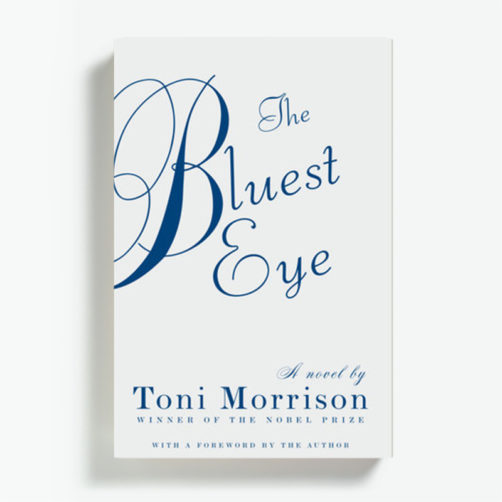
The Bluest Eye by Toni Morrison
This year, I had difficulty focusing and times where I feared my brain was turning to mush due to overstimulation, which I’m a little ashamed to admit here! To relieve the part of my brain that went dormant (or hyperactive) when I tried to enter the world of a new book that wasn’t capturing my attention, I went back to some old favorites: To the Lighthouse by Virginia Woolf, Middlesex by Jeffrey Eugenides, and The Argonauts by Maggie Nelson, which at this point feel like soft, worn sweaters or puzzles I’ve put together and taken apart dozens of times. I like my novels with a healthy dose of melancholy and interiority, and these did just the trick. In August, after hearing the news that the great Toni Morrison had passed away, I went over to my mom’s apartment and found my worn copies of The Bluest Eye and Sula, which I hadn’t read since high school (and had the marginalia to prove it). They blew me away, as much as they had the first time around.
I also loved, in no particular order, Yuko Tsushima’s Territory of Light, Jenny Odell’s How to Do Nothing, Saeed Jones’s How We Fight For Our Lives, Shirley Hazzard’s The Transit of Venus, Ocean Vuong’s On Earth We’re Briefly Gorgeous, Heike Geissler’s Seasonal Associate, Edith Wharton’s The Age of Innocence, and Jackie Wang’s Carceral Capitalism.
CHLOE TEXIER-ROSE
• • •
I thought Ocean Vuong’s On Earth We’re Briefly Gorgeous was a singularly spectacular book—gorgeously written, of course, and ridiculously moving, and just simply brilliant and unshakeable. I also really loved Rivers Solomon’s novella The Deep, mostly because of how beautifully it’s imagined and executed but undeniably in part because of how it came to be—there should (maybe?) be more novels officially inspired by science-fictional hip-hop songs.
SEAN MCDONALD
• • •
Fierce Attachments by Vivian Gornick: A revelation.
How We Fight For Our Lives by Saaed Jones: Fearlessly honest and ultimately very moving.
Busted in New York and Other Essays by Darryl Pickney: An incredibly smart, provocative, and wide-ranging examination of African American literature, racial politics, and cultural trends of the past thirty years.
DARIN KEESLER
• • •
The Topeka School, by Ben Lerner. I admire the control he has at the macro level and the micro: he marshals his considerable knowledge with a light touch, in sentences that go careering along but never slip his grip. Also, there’s a scene toward the end of the book, when the narrator is on a playground with his daughter that presents a parenting conundrum that I’m still thinking about.
Then We Came to the End by Joshua Ferris: I kept waiting to get sick of the second-person narration, but I never did. And I thought Ferris flawlessly handled the necessary transition from the early comedy to a more serious tone.
The House of Mirth by Edith Wharton: I know Edith Wharton’s a supposed downer, but this book is savagely funny in places, and any novel that communicates this clearly and completely the psychological and emotional states of its characters is not going to depress me—I read to feel connected to other people, after all. (That said, things really don’t go well for poor Lily Bart.)
SCOTT AUERBACH
• • •
Laurent Binet’s HHhH is an incredibly smart and gripping work of historical fiction that operates with self-awareness at the limitations of writing about history and the challenges of bringing alive the past without cheapening it. He writes in the voice of a first-person narrator who is imperfect and admits instances of misguiding us or shaping the narrative. Thus, we not only get an extremely engrossing account of WWII, but also a meta-story about what our role is in relation to these histories today and what it looks like to grapple in real time with complex and deeply rooted narratives.
The Made-Up Man by Joseph Scapellato was such a fun ride and so thought-provoking. The main character Stanley agrees to apartment-sit for his uncle in Prague. However, his uncle is also a performance artist who chooses art above all, and little by little Stanley starts noticing aspects of his life that feel manipulated and out of his control. Stanley’s own face appears on the front page of a newspaper someone else is reading on the train; he comes home to find his computer desktop image changed; there are even actors playing the parts of people in his life. This book gets at essential questions of how art and life intersect, how much we can control the way our character is portrayed and manipulated by others, and whether we all exist in a performance of sorts.
The Exhibition of Persephone Q by Jessi Jezewska Stevens is coming out next March and it is stunning. Persephone Q challenges our expectations of a protagonist; she is fueled by impulse, sometimes acting out. She wanders NYC alone at night through a haunted post-9/11 landscape, and much like her night escapades, moving through this beautiful story felt dream-like and surreal. When she finds out an ex has used and tampered with an intimate old photo of her for his art exhibition, her entire sense of self is called into question. Similarly to the Scapellato protagonist, her identity is taken hold of by someone else as the outside world ceases to validate her reality.
MAIA SACCA-SCHAEFFER
• • •
The book of the year for me has been P.D. Eastman’s Go, Dog. Go!, an indelible, masterfully wrought portrait of ordinary dogs trying to make it to a dog party by whatever means of transportation are at their disposal—boat, blimp, car, skiis, etc. It is a book I return to again and again (at the direction of a little emperor) and the only book I have read more than ten times in a single day (though not by choice). The celebration depicted in the book’s closing pages is truly a dog party for the ages.
BRIAN GITTIS
• • •
Freshwater was my first, and favorite read of 2019. Akwaeke Emezi’s talent drips from the text in an overwhelming way that is both painful and addicting. I reread Near to the Wild Heart this year while taking a course on Clarice Lispector’s oeuvre at the Brooklyn Institute for Social Research and was reminded of her tremendous interiority and why her books are lapped up feverishly by all who read her. Such Small Hands by Andrés Barba (inspired by Clarice Lispector) pulses with violence at the perimeter of the text.
AMANDA INMAN
• • •
I read Natalia Ginzburg’s All Our Yesterdays this last summer. The novel has a heroic quality even though that is not its intention. Two Italian families live across the street from one another—one rich, one poor—during the years of World War Two, and out of that mix comes something almost epic. Indeed, some of the characters are tagged repeatedly with an epithet, as you would find in Homer. I love the book’s sadness, its humor, the music it makes. I haven’t read anything as powerful in a very long time.
MITZI ANGEL
• • •
Lennon Reborn by Scarlett Cole took me on an emotional ride through the mind of a young man haunted by a tragedy that left him feeling unworthy of love. However, my favorite book this year was Loving a Warrior by Melanie Hansen. I enjoyed the gradual romance between Matt and Shane.
URSULA SHAND
• • •
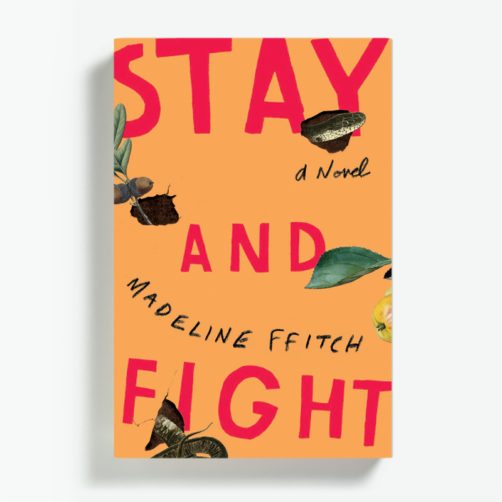
Stay and Fight by Madeline ffitch
To conserve space on a trip abroad, my friend and I brought three books that we traded between each other. It’s probably not a coincidence that those turned out to be my favorite books of the year, but I regret nothing about this entry. Those three books were Stay and Fight, by Madeline ffitch (perhaps a permanent favorite now), Station Eleven, by Emily St. John Mandel (sure, five years late, but there’s a special pleasure in mentioning a hit to people several years later and watching them go, “Oh, yeah,” and also getting primed for the author’s new book in spring 2020), and Take Me Apart, by Sara Sligar (out this April—keep it on your radar!).
JANINE BARLOW
• • •
I had a baby this year (well, technically last year—she was born on December 30th) so I didn’t get a lot of non-work reading done. I also have a 3 and a half year old often described as “spirited” and “strong-willed.” So, much to my embarrassment, one of the few non-work books I read this year was a parenting book called Being at Your Best When Your Kids Are at Their Worst by Kim John Payne. “A practical, meditative approach that can be used in the moment to help you stay calm and balanced when your child’s behavior is pushing you to your limit.” I have never read a self-help book before. So I didn’t think I would be someone who would turn to parenting books. But Lord Almighty I need all the help I can get. And helped me, this has. Not just at bedtime when my kid insists he needs to re-brush his teeth, drink a glass of water, go poop, hug dada, read another story, tell me a secret, call Nana to say goodnight, tickle my back. But also when I’m talking to an author who simply cannot understand why they aren’t allowed to re-write their entire book in second pass. This book has taught me to “sense what your child’s [author’s] deeper needs are even though they are misbehaving” and “respond in a way that gives your child [author] a feeling of being heard and still puts a boundary in place.” I’m only sort of trying to be funny here. As I navigate parenthood, I’m finding that the practice of respecting my child and his emotional reactions, even though they feel irrational to me, is something I want to cultivate in all of my relationships. Who doesn’t want to be more patient? More understanding? And where better to start than with your spirited child?
EMILY BELL
• • •
This year, I was on a real Latinx kick. I’m not sure if that was intentional, or if there are just a lot of really talented Latinx writers being published right now. Either way, two of my favorite books were genre mashups that I just can’t stop thinking about, one from a Puerto Rican writer and the other from a Dominican writer (no bias here, I swear—they’re just really damn good).
Gabino Iglesias writes vicious, profane, deeply textured characters who experience the world in all its horrific complexity. In Coyote Songs, crime noir meets Lovecraftian horror—a boy seeks revenge against an unholy force for killing his father; a people smuggler enacting what he believes to be a mission from the Virgin Mary delivers beatdowns to the children he’s moving across the border in the hope of convincing border agents of the perils of the life they’re fleeing; and the American Southwest is a bleak, brutal landscape onto which Iglesias charts the true terror of living in the world today.
And in Tentacle, Dominican writer/singer/songwriter Rita Indiana maps the aesthetic of Blade Runner onto her tiny island homeland, delivering a cogent critique of colonialism and it’s abiding effects on not only our lives today, but the lives we might one day face in a climate crisis-induced post-apocalypse. Indiana’s cyber-punk, afro-syncretic vision of Santo Domingo is an utterly refreshing take on some very familiar genre elements centered on a magnetic, trans, sex worker who is burdened with the task of traveling backwards in time to save the world.
DANNY VAZQUEZ
• • •
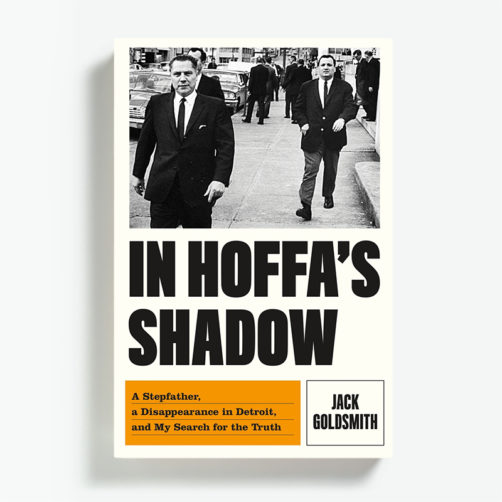
In Hoffa’s Shadow by Jack Goldsmith
Who knew a distinguished Harvard law professor would be the stepson of Jimmy Hoffa’s right hand man, or that this professor would write such an arresting meditation on fathers and sons, loyalty and truth. The Irishman has nothing on In Hoffa’s Shadow.
Robert Lowell is so much in the DNA of FSG that it is thrilling to have The Dolphin Letters, 1970—1979 (edited by Saskia Hamilton) on the list. The Lowell-Hardwick correspondence which covers the devastating break up of their marriage, turns on questions of art and appropriation.
ILEENE SMITH
• • •
Two books have especially stayed with me this year. The first was Ocean Vuong’s On Earth We’re Briefly Gorgeous. I will admit I went in a little skeptical. Whenever a literary novel commands a lot of money, the hype machine starts fast and furious. And I don’t always connect with poetic prose. But the second half of the novel—about an unlikely love affair—was rendered in such hallucinatory and hypnotic language that every detail felt fresh and new, filled with the joy of discovery and, ultimately, the sadness that only a doomed teenage love affair can bring. The second book was Shirley Hazzard’s The Transit of Venus which is such a masterpiece that the only thing I could do when I was finished was to read it again.
COLIN DICKERMAN
• • •
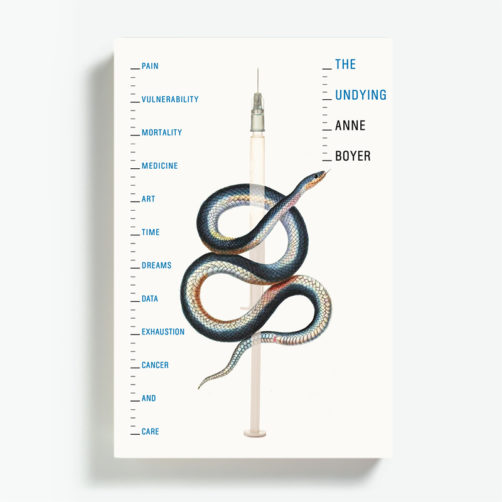
The Undying by Anne Boyer
Anne Boyer’s The Undying—a shattering, intellectually and emotionally rigorous reckoning with cancer and the cultural-medical complex that shapes the experience of patients.
ERIC CHINSKI
• • •
I think I was in great need of escape this year. All three of these novels took me to places far away from Trump USA:
Ghost Wall by Sarah Moss: Completely unexpected. Who would have thought that a short novel about a family spending their summer holiday in England re-enacting life during the Iron Age would shake me to my core? Not I. But it did.
Stay and Fight by Madeline ffitch: What a surprise from the very first sentence (“One winter, Rudy got an infection in his testicles while he lay out drunk on coal company land in a one-room shack that didn’t belong to him.”) to the very last completely satisfying moment. Three women, a child plus the aforementioned Rudy, living off the grid. It took me right in. This was my favorite novel of the year.
Five Days Gone by Laura Cumming: Who could resist a true story about the disappearance of a three year old girl from a beach in 1930s England and her reappearance, alive and safe, five days later with no apparent explanation? The little girl was Cumming’s mother. The author digs into this family mystery and unearths something much larger. This book swept me away.
LOTTCHEN SHIVERS
• • •
The Lathe of Heaven by Ursula K. Le Guin: Inspired by ancient Chinese paradoxes, the follies of Utilitarianism, and Victor Hugo’s observation that “the dream is the aquarium of Night,” Ursula Le Guin destroys and reconstructs Portland, Oregon—as well as any prospect of a shared, stable reality—several times, leaving us with seemingly benevolent alien sea turtles, a hypothetical love story, and a Beatles song.
Father and Son by Edmund Gosse: A distinguished scientist and evangelical becomes a widower and retreats to the countryside, where he will raise his son and combat the immoralities and heresies of the age, especially Charles Darwin’s. The son of this otherworldly father writes a memoir that is tender and terrestrial and, finally and splendidly, unsparing.
Early Work by Andrew Martin: In a seventh grade Entertainment Studies paper, David Foster Wallace’s Hal Incandenza wrote that the modern action hero and post-modern reaction hero were obsolete and thus “we await, I predict, the hero of non-action”; he might have been anticipating the protagonist of Andrew Martin’s Early Work, stoned and reading on the couch. And yet there is much more than that to this novel, which puts the slacker ethos of the 1990s into contemporary terms, and somehow gets it to be funnier, and more affecting and profound, than it ever was.
Antisocial by Andrew Marantz: What makes a troll? What do trolls do? And what do trolls make of us and do to us? This book is indispensable contemporary history—a vivid accounting of the alt-right and alt-light’s feuding personalities, the Silicon Valley business models that enable them, and what happens when algorithms, sick humor, bigotry and “everything I do is a video” narcissism collide.
ALEXANDER STAR
• • •
I loved, have always loved, Native Speaker by Chang-Rae Lee. It’s a book that interrogates the imposter in me, urges me to call my father more often, breaks and unbreaks my heart. I re-read it every year so that these things will continue to happen to me. Speaking of heartbreak, I read also Chris Adrian’s ethereal story collection A Better Angel. Adrian is able to look squarely into the abyss of the human heart; somehow, he always, always finds love. In one story, “The Changeling,” a father wrestles the demons that have taken residence in his young son:
“You are breaking my heart,” I say.
“Yes,” say the voices. “Into two thousand, nine hundred, and ninety-eight pieces.”
DEBORAH GHIM
• • •
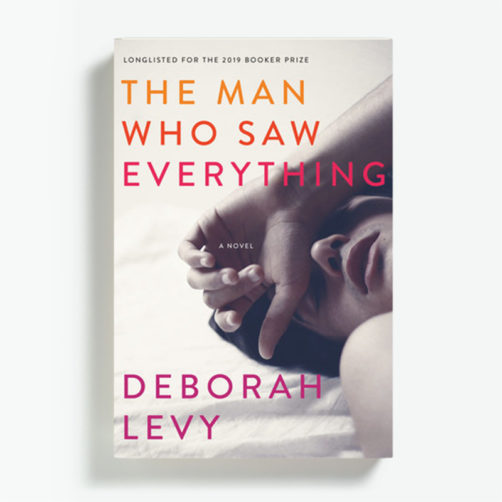
The Man Who Saw Everything by Deborah Levy
Deborah Levy’s The Man Who Saw Everything is about a historian trying to cross a road for thirty years. He wears his mother’s pearls and a hint of mascara. As I finished the last pages on the subway, I caught a whiff of cherry blossoms, even though it was raining and the train smelled, as you’d expect, like an old foot thawed in the microwave. Unlike an old foot, this novel is beautiful—understated and alive.
Speaking of geniuses, Natalia Ginzburg! Two novels, published beautifully by New Directions, The Dry Heart and Happiness, as Such, pulse with Grace Paley’s dictum that great fiction register “the facts of money and blood.” Ginzburg writes about family ties severed and sutured with a precision that is never surgical. Will she make you want to punctuate every question with a period.
I loved Barbara Browning’s The Gift for living up to its title so completely. I carried my (borrowed) copy in my backpack for weeks before lending it onward.
MILO WALLS
• • •
I made the very accidental (subconscious?) decision to start and end my year with Deborah Levy. Talk about self-care! This was the best gift I made myself all year. The Cost of Living is like a contemporary A Room of One’s Own and a perfect example of a short book that you want to last forever. I’m parceling out The Man Who Saw Everything over the next few weeks and it is just as filled with those sly insertions Levy does so well, moments where the world you’re in and the one she’s built both shift and shimmer entirely based on a single detail.
This year’s Tove Jansson Summer Book Club pick was The True Deceiver. With lines like “The truth needs to be hammered in with iron spikes, but no one can drive nails into a mattress!” it had to be one of my favorite reads of the year.
And Kerry Egan’s On Living. Egan is a hospice chaplain and these stories of her time with near-death patients and their loved ones are filled with hope and lessons that make the everyday feel more manageable, possible, joyful. It’s exactly the kind of book that we need to guide us through this complicated world, to keep us in love with it and with our fellow humans.
JENNA JOHNSON
• • •
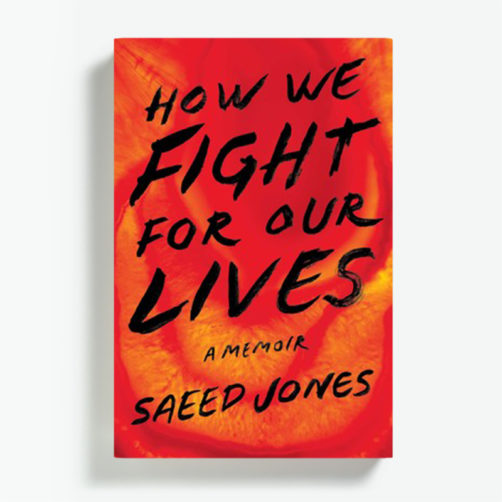
How We Fight for Our Lives by Saeed Jones
How We Fight for Our Lives by Saeed Jones: Jones’s memoir is written with the gorgeous prose of a poet. Both in moments of humor and raw emotion, his voice is remarkably honest and distinct. After I finished reading, I closed the book and sat in my quiet bedroom, trying to keep the feeling of it with me for as long as I could.
Richard Nixon: The Life by John A. Farrell: My exercise for the summer was lugging around this tome, but don’t be intimidated by its length! Farrell’s biography of Nixon is fascinating and impressively narrative, and, when I finished (if you can believe it), I wanted more. It is particularly captivating to revisit the scandals and downfalls of Nixon’s presidency right now and to remember what an impeachment process looked like in the 1970s.
KATIE LIPTAK
THE FSG BOOKS WE’RE GIVING THIS YEAR
What’s a better gift than the singular, captivating, and winsome voice of Chris Rush’s The Light Years? It’s one of my favorite books of the year but it spans beyond that; it feels timeless like the best cult classics.
NIKKI BARNHART
• • •
The Undying by Anne Boyer to all my nearest and dearest undead.
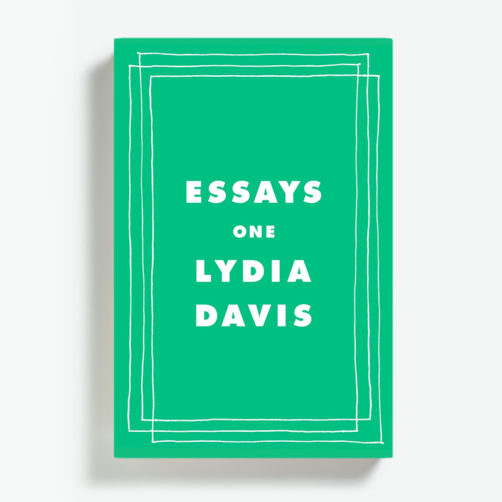
Essays by Lydia Davis
Essays One by Lydia Davis to everyone who has been begging me for a copy. Well, okay, not everyone.
Vernon Subutex 1 by Virginie Despentes to all my aging punks of whatever age.
Dead Astronauts by Jeff VanderMeer to some, but not all, of my parallel universe selves. (You know who you are, and what you did.)
JEREMY DAVIES
• • •
All year I’ve been pushing How to Hide an Empire by Daniel Immerwahr into the hands of family and friends, and the giving continues this holiday! It’s insightful, well researched, paradigm-shifting, and absolutely riveting.
LYDIA ZOELLS
• • •
I know my mom has read and enjoyed Cathleen Schine in the past, so The Grammarians is a good bet for her. I think Lizabeth Cohen’s Saving America’s Cities and Douglas Smith’s The Russian Job could both be good for my father. I don’t have a particular person in mind for this one, but Jonathan Fetter-Vorm’s Moonbound is a beautiful, extremely gift-able book. Pair it with the new 50th anniversary edition of Michael Collins’s classic Carrying the Fire for anyone interested in space.
STEPHEN WEIL
• • •
The Unpassing and The Undying! The former, an electric, indelible novel with a vivid sense of place and character; the latter, a formidable, righteously angry work of prose by a poet (my favorite) on the staggering injustices inflicted on the sick and dying in this country.
JULIA RINGO
• • •
Find Me by André Aciman
Severance by Ling Ma
How to Hide an Empire by Daniel Immerwahr
MADELINE DAY
• • •
Wake, Siren for people who loved Circe as much as I did—Nina MacLaughlin reaches back to the classics to provide a fresh angle on the #MeToo movement but also writes luscious, experimental, exuberant prose.
Cathleen Schine’s The Grammarians for guilty Woody Allen fans. This provides a highly entertaining, heartfelt portrait of neurotic New Yorkers, sisterhood, and language love.
I’m also excited to give a Topeka-based twofer to certain special people. The Topeka School continues and expands Ben Lerner’s genius autofiction project that started with Leaving the Atocha Station and 10:04. Longtime fans will be treated to his special mix of shimmering language, blistering intelligence, and wry-self knowledge, but here there’s an extra depth to his earnest, pained, empathetic examination of toxic masculinity—but also of complicated family dynamics. The Westboro Baptist Church plays a supporting role, and for those looking for some hope in the darkness, I’ll throw in Unfollow, a deeply felt, heartrending, and brave memoir by Westboro Baptist church apostate Megan Phelps-Roper. It chronicles her indoctrination from birth into a hateful but tightly-knit family and community and how she found the courage to leave it behind and embrace a life of tolerance and communication. Her story is one of the few positive arguments I’ve seen for (at least early) Twitter life…
FLORA ESTERLY
• • •
I’m giving everyone I know the same two books because they’re perfect and you can’t beat perfection. Those two books are Ling Ma’s Severance (which I gave my sister for a plane ride, and which she not only finished in that one sitting, but which she immediately lent to a friend upon landing so she could have someone to discuss it with) and Anna Weiner’s Uncanny Valley, which is perfect for anyone who has even the slightest doubts about their relationship with tech (so, all of us). I’d be remiss not to mention the Picador Modern Classics line of beautiful books in beautiful miniature editions, which are perfect stocking stuffers.
LIAT KAPLAN
• • •
Terry Tempest Williams’s new essay collection Erosion: Essays of Undoing. I can’t think of a more powerful book to give someone during a time of celebration, and before the next election year.
LAUREN ROBERTS
• • •
My mother and stepmother will get copies of Essays One by Lydia Davis, who tends to leave me awe-stricken with her genius. Both of them are already fans of hers, and the object itself: substantial, with a bright and iconic kelly green cover, is stunning—the perfect gift, in my opinion. I’ll give a copy of Uncanny Valley to my friend who just started working at F*ceb*ok, and to another friend who is moving to San Francisco in January to work at some start-up—that’s appropriate, right?
CHLOE TEXIER-ROSE
• • •
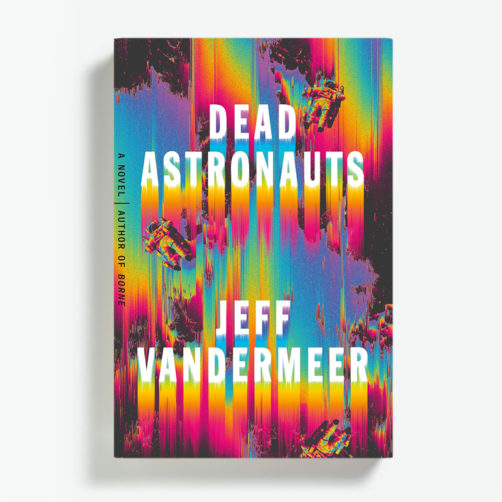
Dead Astronauts by Jeff VanderMeer
This is self-serving, but Jeff VanderMeer’s Dead Astronauts—it is the most physically beautiful, gift-ready book I’ve ever been involved with. From the cover to the interior design to the production miracle of the foil-stamped case—and Mario Tauchi’s illustrations!—it’s sure to please anyone who likes good and beautiful things.
SEAN MCDONALD
• • •
The Picador Modern Classics, particularly The Hours, for its cheery cover. It doesn’t matter if the recipient already has a copy of the novel in its previous editions.
97,196 Words by Emmanuel Carrère: There is an essay in this book for anyone: from a botched celebrity interview with Catherine Deneuve; a comical insider’s view of the economic summit at Davos; a fly-on-the-wall portrait of a young, American heroin addict; an erotic (true?) story; even an appraisal of Philip K Dick. More people should read him.
DARIN KEESLER
• • •
I’m excited to get my dad Jack Goldsmith’s In Hoffa’s Shadow and Steven Price’s Lampedusa (The Leopard is one of his favorite novels).
SCOTT AUERBACH
• • •
In Hoffa’s Shadow by Jack Goldsmith for my parents and grandparents, The Black Cathedral for my brother, and the Flannery O’Connor reissues always make a beautiful gift set. I’ve also already gifted to friends Severance by Ling Ma, Miracle Creek by Angie Kim, and the Call Me by Your Name follow-up Find Me by André Aciman!
MAIA SACCA-SCHAEFFER
• • •
I am gifting everyone with Ghost Wall this holiday season. There is a great friction between the sweet portability of this petite book and the heavy jagged material contained within. It is a book that reeks of disquiet and is taut with isolation and fear—a natural accessory for the holidays.
AMANDA INMAN
• • •
Lydia Davis’s Essays One.
MITZI ANGEL
• • •
I’m looking forward to giving copies of Call Me by Your Name and Find Me to relatives.
URSULA SHAND
• • •
Definitely Wake, Siren for friends who liked books like Circe. Carrie Fisher and Still Here (about Elaine Stritch)—you know there are people on your list who will start gushing about how much they love her (whichever the “her” in question is) when they open those. I won’t be the only one to say this, but if you ran out of discussion material with your family over Thanksgiving and committed to four hours of The Irishman as a result, you know you can bring that magic back but better with In Hoffa’s Shadow. Finally, consider Transaction Man for the family member who disturbingly idolizes CEOs (do you really not have one?). Happy holidays!
JANINE BARLOW
• • •
Uncanny Valley by Anna Wiener: It is a memoir about Anna’s time working in tech in San Francisco from 2012-2016 and it is compulsively readable, slyly educative, and funny as hell.
Jordan Kisner’s essay collection, Thin Places: Kisner is an authentically curious writer—simultaneously open-minded and opinionated. Reading her work reorients my attention and shifts my perception, which is exactly what I want from narrative nonfiction. She’s very, very good.
EMILY BELL
• • •
This year, I’ll be gifting Fernando A. Flores’s Tears of the Trufflepig. This book has everything you could possibly want in a novel—synthetic animals which have replaced the black market for illicit drugs in a near-future portrayal of the U.S./Mexico border states, a cast of oddball characters plodding through a quixotic journey involving the sale of a piece of heavy machinery, the resurrection of an imagined indigenous tribe, and a brilliant critique on the nature of borders in the modern world.
DANNY VAZQUEZ
• • •
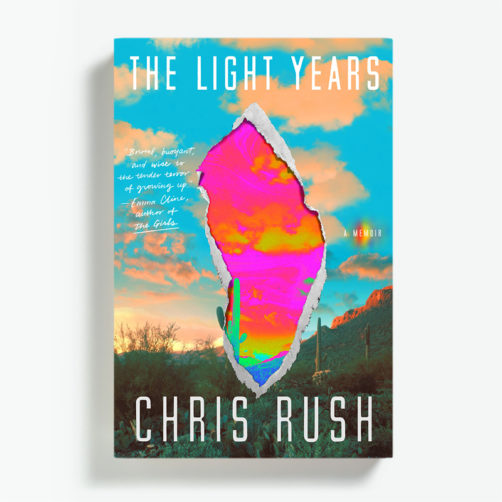
The Light Years by Chris Rush
Joan Didion’s entire backlist, because of course.
Leonard Cohan’s The Flame, which is beautiful, with a fantastic cover and a fitting last book from a true legend.
Chris Rush’s The Light Years, which has so much heart, and has found enthusiastic fans both young and old.
Ling Ma’s Severance, because who doesn’t love a ridiculously smart, sly, post-apocalyptic zombie novel?
COLIN DICKERMAN
• • •
In Hoffa’s Shadow by Jack Goldsmith: Three storylines in one book—all fascinating: a portrait of Jimmy Hoffa and new details about his disappearance—still unsolved forty-five years later, an unexpected father/son story, and a new look at the Teamsters and Hoffa, Bobby Kennedy, Richard Nixon, and the Mafia. Backroom twentieth-century American history.
The Grammarians by Cathleen Schine: Family, smart, funny, insightful = Cathleen Schine.
The Topeka School by Ben Lerner: Everyone is asking for this novel to be under the Christmas tree and in the Hanukkah pile.
Essays One by Lydia Davis: The perfect gift partly due to its gorgeous green jacket. You don’t even need to wrap it. Just add a ribbon.
Still Here by Alexandra Jacobs: This Elaine Stritch biography is for the feminist or Broadway addict in your family. Stritch was ahead of her time and one of a kind.
Family Papers by Sarah Stein: Stein tells the rich history of the Levy family diaspora which stretched from Greece to Western Europe, Northern England, Israel, Brazil, and India. Her amazing research and the family members’ stories she shares bring it all to life.
How to Hide an Empire by Daniel Immerwahr: American history you were never taught in school, some of it jaw-dropping.
LOTTCHEN SHIVERS
• • •
The Dolphin Letters, 1970—1979 by Elizabeth Hardwick and Robert Lowell, edited by Saskia Hamilton
Dead Astronauts by Jeff VanderMeer
Essays One by Lydia Davis
Oblivion Banjo by Charles Wright
ALEXANDER STAR
• • •
Anne Boyer’s The Undying. Because it’s gorgeous, but also I’m being intentionally prescriptive: Read this! Let’s discuss! Let’s talk about all of the things that are literally and metaphorically killing us.
DEBORAH GHIM
• • •
I’m giving the quickest and most alert reader I know Lydia Davis’ Essays One. This brick of a book will hit you harder. For my brilliant and intermittently stoned friend: Andrew Martin’s Early Work. For anyone having trouble reading for pleasure: Garth Greenwell’s Cleanness.
MILO WALLS
• • •
Always Flannery O’Connor’s A Prayer Journal. For their sheer gorgeous giftabilty, Dead Astronauts by Jeff VanderMeer and Ghost Wall by Sarah Moss. To help people get ready for the new year, Good Habits, Bad Habits by Wendy Wood. And to inspire them to keep history in next year’s important civic conversations, Desk 88 by Sherrod Brown.
JENNA JOHNSON
• • •
The Dolphin Letters, 1970—1979 by Elizabeth Hardwick and Robert Lowell, edited by Saskia Hamilton: This book is gorgeous—plus, who doesn’t want to feel like they were apart of Hardwick, Lowell, Bishop, and Rich’s circle for at least a little while? It’s fascinating to delve into these letters and hear Hardwick and Lowell’s voices sound so clearly.
Dead Astronauts by Jeff VanderMeer: Believe it or not, it’s not just because of the cover.
KATIE LIPTAK
